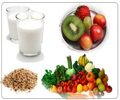The basal metabolic rate is boosted during winter which helps to lose weight during winter, along with consistent dietary and exercise protocols.
- The winter season speeds up our body's metabolic rate to stay regulated with the cold temperature
- Healthy tips such as staying hydrated, daily serving of fresh fruit and vegetables, and limiting alcohol and caffeine, can bolster weight loss journey in winter //
- Sticking to a nutritious well-balanced diet with consistent workouts is always the blueprint for a weight loss plan
Winter Steps-Up Metabolism - The Key to Weight Loss
Metabolism speeds up in winter and the body burns more calories to balance the temperature in the cold season.Seasonal changes in metabolic and temperature responses to cold air in humans
Go to source).
Staying active and eating mindfully makes winter the best time to lose weight.
Dietary Recommendations for Weight Loss in Winter
- Refresh with Detox Drinks: Detox drinks always top the diet chart for weight loss, be it any time of the year. Water, infused with various healthy herbs and spices, flushes out the toxins in the body and revamps the regular functioning of the body. Detox drinks on an empty stomach are much more effective for weight loss.
- Healthy Breakfast: A wholesome breakfast including all the major food groups such as fresh fruits, vegetables, and whole grains, gives a healthy start to the day. Avoid/limit foods enriched with carbs and processed fats.
- Hydration: Winter reduces the feeling of thirst and automatically lowers water intake. This may lead to dehydration, which is often mistaken for hunger.
- Limit High Sugar Indulgences: Desserts and high-sugar treats can compromise your weight loss regime. Limiting high-sugar foods or having them during the day, rather than at the end of the day, helps to metabolize the sugar and fats consumed, keeping your calories in check.
- Cut Caffeine Consumption: It's common to have hot sips of coffee and tea to stay warm during winter. However, excess caffeine consumption may lead to dehydration, resulting in overeating. So limit caffeine or replace them with healthy detox drinks.
- Watch Your Alcohol Intake: Winter brings along festivities, which automatically call for parties and alcohol. However excess alcohol consumption may disrupt sleep and add excess calories. Healthy snacking before a party not only helps to limit alcohol intake but also controls the meal portions served at the parties.
- Winter Superfoods: Fruits and vegetables load you with every essential nutrient your body needs to stay healthy. Additionally, foods like ghee, jaggery, dry fruits, nuts, etc. keep you fortified and warm, further boosting the weight loss process.
Along with the above guidelines, sticking to a well-balanced diet with a regular workout regime can help you keep at the right strides of your weight loss journey this winter.
Disclaimer: The content on this page is meant to be an informative resource and is not meant to replace advice from a medical professional. It is always best to consult a healthcare provider with any concerns.
Reference:
- Seasonal changes in metabolic and temperature responses to cold air in humans - (https://pubmed.ncbi.nlm.nih.gov/15276821/)
Source-Medindia















